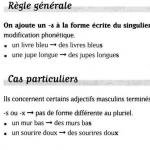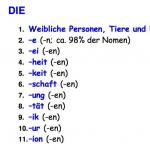Nouns in German, as in Russian, can be of three genders: masculine, feminine and neuter:
der (ein) Mann (m) - man (masculine - Maskulinum),
die (eine) Frau (f) - woman (feminine - Femininum),
das (ein) Fenster (n) - window (neuter - Neutrum).
Gender in German, as you can see, is expressed through the article.
The man will, of course, be masculine, and the woman feminine.
But with inanimate objects it is already more difficult. They, as in Russian, are not necessarily of the middle, “neutral” gender, but belong to different genders. Closet in Russian, for some reason, a man, but shelf- a woman, although they have no sexual characteristics. Likewise in German. The trouble is that the gender in Russian and German often does not match, that the Germans see the gender of objects in a different way. It may (accidentally) coincide, it may not. For example, der Schrank (cabinet)- male, das Regal (shelf)- average.das Weib (woman, woman) and das Mädchen (girl, girl) are neuter.
You should try to remember the word in German with the article!
Sometimes, by the shape of a word, you can guess what kind it is. For example, by the way the word ends. As in Russian words for -ost, - tsiya, - iya, - aya, - tsa, - ka, - ah ...- feminine, and German words for:
die Melo die- melody, die Situa tion– situation, die Kult ur– culture, die Tend enz- trend, die Speziali tat- a traditional dish (of any region), die Maler ei– painting, die Fest ung- fortress, die Frei heit- freedom, die Möglich keit– opportunity, die Wissen schaft- the science…
Some suffixes, which in Russian correspond to the masculine gender, in German, on the contrary, are a sign of the feminine gender: die Reg ion- region, die Diagn ose– diagnosis, die Gar age- garage…
Words that end in -e, most often feminine: die Wanna – bath, die Woche - a week. This -e corresponds to the Russian ending -and I). But in Russian there are also masculine words with a similar ending (uncle, cabin boy). Likewise in German: der Junge is a boy.
Note also that the words -ling always masculine: Lehr ling (student, apprentice).
Many monosyllabic (sometimes two-syllable - because of the prefix) nouns formed from verbs belong to the masculine gender:
derBeginning< – beginnen (начало – начинать), der Blick < – blicken (взгляд, вид – взглянуть), der Klang < – klingen (звук – звучать), der Begriff < – begreifen (понятие – понимать), der Sieg < – siegen (победа – побеждать). But: Das Spiel< – spielen (игра – играть).
It also greatly facilitates the fact that you can take any verb in the indefinite form and attach the neuter article to it. Get the name of the process:
Das Sprechen< – sprechen (говорение – говорить), das Leben < – leben (жизнь – жить), das Essen < – essen (еда – есть).
Signs that the word is masculine:
Signs that the word is feminine:

Signs that the word is neuter:

Interestingly, some nouns have different meanings depending on the gender. For example:
der See (lake) - die See (sea),
der Band (volume) - das Band (tape),
das Steuer (rudder, steering wheel) - die Steuer (tax),
der Leiter (leader) - die Leiter (ladder),
der Tor (fool) - das Tor (gate),
der Schild (shield) - das Schild (signboard, tablet),
der Bauer (peasant) – das Bauer (cage)
a. by semantic meaning
- male persons:
der Mann - man, der Onkel - uncle; - male animals:
der Bär - bear, der Hahn - rooster; - names of countries of the world, lakes, mountains and winds:
der Osten - East, der Bodensee - Lake Constance,
der Harz - Harz, der Taifun - typhoon; - names of the seasons, months and days of the week:
der Sommer - summer, der Januar - January, der Sonntag - Sunday.
b. in form
- nouns with suffixes -er, -neg, -ler, -ling:
der Schlosser - locksmith, der Redner - speaker,
der Sportler - athlete, der Lehrling - student; - most of the nouns formed from the stem of the verb without adding a suffix:
der Lauf (run) - from laufen (run)
der Sprung (jump) - from springen (to jump); - foreign (borrowed from other languages) nouns with suffixes -ist, -ent, -ant, -eur, -är, -or, -ismus:
der Polizist, der Student, der Aspirant, der Ingenieur, der Militär, der Doktor, der Egoismus.
The feminine gender in German is:
a. by semantic meaning
- nouns denoting:
- female persons:
die Frau - woman, die Tante - aunt.
Exception: das Mädchen - girl, girl, das Weib - woman, woman; - some female animals:
die Kuh - cow, die Katze - cat.
Exception: das Schaf - sheep; - names of most flowers, trees and songbirds:
die Rose - rose, die Tanne - spruce, die Eiche - oak,
die Lerche - lark, die Nachtigall - nightingale; - names of most German rivers:
die Elbe - Elbe, die Spree - Spree, die Saale - Hall, etc.
Exception: der Rhein, der Main, der Neckar, der Inn; - river names that have feminine equivalents in Russian:
die Wolga - Volga, die Oka - Oka, die Kama - Kama ( with the exception of: der Ob - Ob).
b. in form
- nouns with suffixes -in, -ung, -keit, -heit, -schaft, -ei:
- -in:
die Sängerin - singer
die Bärin - she-bear - - ung:
die Forderung - requirement
die Zeitung - newspaper - - keith:
die Möglichkeit - opportunity
die Richtigkeit - correctness - - heit:
die Kindheit - childhood
die Neuheit - news - - schaft:
die Wirtschaft - household
die Bereitschaft - readiness - -ei:
die Bäckerei - bakery
die Bücherei - library;
- borrowed nouns with suffixes -ie, -ik, -ion, -tion, -tat, -ur:
die Chemie, die Mathematik, die Million, die Organization, die Fakultät, die Natur.
The neuter gender in German includes:
a. by semantic meaning
- names of parts of the world, countries and cities:
(das) Europa - Europe, (das) China - China, (das) Belgien - Belgium,
(das) München - Munich, (das) Prag - Prague, etc.
Exception: country names ending in -ei, -au:
die Mongolei - Mongolia, die Moldau - Moldova, and also die Schweiz - Switzerland,
der Iran - Iran, die Ukraine - Ukraine and some others; - metal names:
das Eisen - iron, das Gold - gold, etc.
Exception: der Stahl - steel, der Schwefel - sulfur; - names of children (baby animals):
das Kind - child, das Kalb - calf, das Lamm - lamb, etc.; - letter names:
das "A", das "Z".
b. in form
- diminutive nouns with suffixes -chen, -lein and with suffixes -tel, -tum:
das Häuschen - house, das Büchlein - little book,
das Viertel - quarter, das Eigentum - property; - nouns formed from adjectives with a suffix -e and denoting abstract concepts:
das Neue - new, das Interessante - interesting; - borrowed nouns with suffix -um, -ment:
das Museum - museum, das Dokument - document.
- Some German nouns with the same spelling and pronunciation have different meanings depending on the gender:
- die See (sea) - der See (lake);
die Steuer (tax) - das Steuer (rudder), etc.
The gender of nouns in German and Russian often does not match, so it is necessary to memorize nouns with a definite article.
Compare:
- das Pferd (neuter) - horse (feminine);
der Hund (masculine) - dog (feminine);
der Baum (masculine) - tree (neuter);
die Stunde (feminine) - lesson (masculine);
der Spiegel (masculine) - mirror (neuter), etc.
- The gender of any noun can be checked in a dictionary. In dictionaries, the following abbreviations are used to indicate the gender of a noun:
- m(from the Latin word masculinum- masculine);
- f(from the Latin word femininum- feminine gender);
- n(from the Latin word neutrum- neuter gender).
Der, die or das? How to define articles in German? When to use the definite or indefinite article? How to determine the gender of a noun and how to use German articles? Almost all German nouns are preceded by a small word that scares even native speakers, but we can’t be scared, we’ll analyze it in our video and article.
Nouns in German, as well as in Russian, have a gender category - masculine, feminine or neuter. At the same time, the gender of nouns in German and Russian often does not coincide. For example:
das house- neuter, and house- male
die Fliese- feminine, and tile- male
Therefore, nouns must be memorized with the article, which indicates the gender of the noun. Remembering the gender of nouns is often difficult, but many nouns have some features that help determine the gender of these nouns. The gender of nouns can be determined:
- by the meaning of the word;- according to the method of word formation (according to the form of the word).
1.1. Masculine (by meaning)
Male persons - der Mann(man), der Junge(boy)
- male animals der Bar(bear)
- sides of the world - der Norden(north)
- Seasons - sommer(summer), der Winter(winter)
- the names of the months - der Januar(January), der Mai(May), September(September)
- days of the week - der Montag(Monday), der Mittwoch(Wednesday), der Sonntag(Sunday)
- times of day der Morgen(morning), But die Nacht(night)
- precipitation - der Regen(rain), der Schnee(snow)
- minerals - der Granite(granite)
- stones - der Rubin(ruby)
- mountain names der Harz(harz)
- names of lakes - der Baikal(Baikal)
- alcohol - der Wodka(vodka), der Sekt(sparkling wine), but Das Bier(beer)
- monetary units - der Euro(euro) but die Kopeke(penny), die Crown(crown), die Mark(brand)
- celestial bodies der Mond(moon) but die Venus(Venus), die Sonne(Sun)
- names of car brands - der Opel, der BMW
1.2. Masculine (by form)
-er– der Fahrer (driver)
-ler - der Sportler (athlete)
-ner-der Gärtner (gardener)
-ling- der Lehrling (student)
-s - der Fuchs (fox)
Note: do not confuse the suffix <-er> in derivative nouns with words whose root ends in <-er> : die Mutter, die Tochter, das Fenster, etc.
Foreign words (mostly animate) with suffixes:
-ent - der Student (student)
-ant - der Laborant (lab assistant)
-ist - der Publizist (publicist)
-et - der Poet (poet)
-ot - der Pilot (pilot)
-at - der Candidate (candidate)
-soph - der Philosoph (philosopher)
-nom - der Astronom (astronomer)
-graph - der Photograph (photographer)
-eur - der Ingenieur (engineer)
-ier - der Pionier (pioneer)
-ar - der Jubilar (jubilee)
-är - der Sekretär (secretary)
-or - der Doktor (doctor)
Note: inanimate nouns with suffixes <-ent>, <-at>, <-et> can be both masculine and neuter: der Kontinent - das Patent, der Apparat - das Referat, der Planet - das Alphabet.
Nouns formed from the root of verbs without a suffix (often with a change in the root vowel)der Gang - (from ge hen)
der Gru ß - (from grü ßen)
der Sprung - (from spri ngen), But Das Spiel

2.1. Feminine (by meaning)
- female faces die Frau(woman) but das Mädchen (see neuter gender)- female animals die Kuh(cow) but Das Huhn(chicken), Das Schaf(sheep)
- names of trees - die Birke(birch), But der Ahorn(maple)
- color names die Aster(aster), Butder Mohn(poppy), der Kactus(cactus)
- names of berries - die Himbeere(raspberries)
name of fruits and vegetables die Byrne(pear), But der Apfel(apple), der Pfirsich(peach), der Kohl(cabbage), der Kurbis(pumpkin)
- most German rivers - die Elbe, die Oder, die Spree, But der Rhein, der Main, der Neckar
2.2. Feminine (by form)
Nouns with suffixes:-in die Laborantin (lab assistant)
-ung—die Übung (exercise)
-heit—die Freiheit (freedom)
-keit—die Möglichkeit (opportunity)
-schaft —die Landschaft (landscape)
-ei—die Malerei (painting)
Foreign words with stressed suffixes:
-ie—die Chemie (chemistry)
-tät—die Universität (university)
-tion -die Station (station)
-ur—die Kultur (culture)
-ik—die Physik (physics)
-age --die Reportage (reportage)
-ade —die Fassade (facade)
-anz—die Ambulanz (outpatient clinic)
-enz —die Existenz (existence)
Most nouns with a suffix -e (mostly double sided):
die liebe (love)
die Kalte (cold)
die Hilfe (help)
die Lampe (lamp)
Note: there are also a number of nouns male ending in -e: der Kollege, der Russe, der Junge, der Name, der Gedanke, der Käse and several nouns neuter: das Ende, das Interesse, das Auge.
Nouns formed from verbs with a suffix -t:
die Fahrt (riding)
die Kunst (art)
die macht (power)
Related cheat sheets to keep yourself and enjoy:



3.2. Neuter gender (by form)
Nouns with suffixes:-chen—das Mädchen (girl)
-lein—das Tischlein (table)
-(s)tel -das Fünftel (one fifth)
Most nouns with suffixes:
-tum
das Eigentum (property), But der Reichtum, der Irrtum-nis
das Verhältnis (attitude), But die Kenntnis, die Erlaubnis
Foreign words (objects and abstract concepts) ending in:
-(i)um—das Stadium (stadium)
-ett —das Kabinett (cabinet)
-ment --das Document (document)
-ma—das Drama (drama)
-o —das Kino (cinema)
Nouns with a prefix Ge- :
das Gewasser (waters)
das Gebirge (mountain range)
das Ge mälde (painting)
Substantivized infinitives:
das Laufen (run) - from laufen (run)
das Lesen (reading) - from lesen (to read)
Today we will consider the gender of nouns in German. As in Russian, there are three genders in German: feminine, masculine, and neuter. But! What is feminine in Russian in German can be masculine and neuter and vice versa.
You can recognize the genus by the article: die, der, das. But how do you know which article should come before a particular noun? A - no way. The best thing to do is to learn the word right away along with the article. But there are still some hints...
Read an introductory article about articles here
The gender of nouns in German can be determined by the subject matter of the words:
Some words belonging to one or another thematic group are of the same gender. Not always, of course. But there are similarities.
So, for example, the days of the week, months and seasons are exclusively masculine: der Freitag, der Mai, der Sommer. Parts of the day - too, but here there is a small exception: die Nacht - feminine.
In addition, professions are masculine (initially, if you didn’t add the ending -in, then it will turn into a feminine profession), parts of the world, weather and precipitation, car brands, alcoholic beverages (except for beer, which is neuter: das Bier ).
Here is a visual picture I prepared especially for you:
What German nouns are feminine?
Most plants in German are feminine: trees, flowers, and berries with fruits. In general, vegetation more often female. Because mother nature (feminine) created it: die Rose, die Banane. Although mushrooms are predominantly masculine.
By the way! As I mentioned above - car brands in German are men. But: you will surely meet someday: die BMW. Don't grab your head. The explanation for this is the simplest: it means that in front of you is not a car, but a motorcycle. Because motorcycle brands in German are feminine. Here it is - our beloved and insidious German language)))
Neutral gender in German are the names of countries (most), continents and many islands, names of children and cubs, languages, names of hotels (das Kempinski), colors (das Rot), letters (das C). As well as verbal nouns, such as: das Lachen - laughter, das Essen - food. And nouns formed from adjectives: das Gute - good.
The gender of German nouns can be determined by the endings
Noun endings are also clues. Unless, of course, you remember them all.
Feminine nouns are nouns that end in:
- e (majority): die Lampe - lamp, die Erde - earth
- ei: die Bäckerei - bakery, die Schneiderei - atelier
- heit: die Freiheit - freedom, die Krankheit - hospital
- keit: die Wirklichkeit - reality, die Süßigkeit - sweetness
- Schaft: die Freundschaft - friendship
- ung: die Endung - ending, die Heizung - heating
- words of foreign origin ending in -ät, ik, ion, ie, ur, enz: die Universität - university, die Kritik - criticism, die Nation - nation, die Demokratie - democracy, etc.
Masculine nouns are nouns ending in:
- er: der Koffer - suitcase, der Spieler - player
- en: der Rasen - lawn, der Ofen - oven
- ig: der Essig - vinegar, der Honig - honey
- ling: der Zwilling - twin, der Frühling - spring
- words of foreign origin ending in -or, - ist, - ismus: der Organisator - organizer, der Pessimist - pessimist, der Optimismus - optimist
But the following endings give us a signal that we have a neuter noun:
- chen -lein diminutive: das Mäuschen - mouse, das Mäuslein - mouse
- ment: das Instrument - instrument, das Dokument - document
- nis: das Geheimnis - secret, das Ergebnis - result
- tum: das Eigentum - property
- um: das Museum - museum, das Zentrum - center
Do you know what I do when I don’t know the exact gender, but I need to say it correctly in this situation? Just shh, don't tell anyone about this method. In general: I make the word a diminutive. Instead of Tisch I say Tischchen, instead of Hase I say Haschen. Although this is a dubious method: not all words can have this form. And secondly, the addition of such an ending sometimes calls for a change in the root - terrible umlauts can appear there and lead to a friend's mistake. Sometimes I resort to this mini-method 🙄
So: not all German nouns fall under the above rules. Therefore, the advice remains unchanged: learn the word with its article and practice more often. Only a constant concentration on nouns and their gender gives a result. There are also special online exercises on the Internet to determine the gender, you can try. And yes: do not be afraid to make a mistake in a conversation and use the wrong article, because even Germans sometimes also confuse the gender of German nouns.
If you have ever studied German, you know that nouns in this language are divided into three genders: masculine, feminine and neuter. Why know the gender of a noun? Everything is simple. Without gender, you will not be able to use the word correctly in a sentence.
In this article, you will learn how to easily determine the gender of a German noun, even if you met it for the first time.
How to find out the gender of a German noun by the definite article
If you come across a new noun, you can recognize its gender by the definite article. Each of the three genders in German has its own article.
How to find out the gender of a German noun by suffix
The article method is effective, but what if the noun does not have an article? In this case, the form of the word will help you. Some suffixes correspond to one of the three genders.
masculine
Note that -er is not always a masculine suffix. Sometimes -er can be part of the root of a feminine or neuter noun. Example: die Mutter (mother) or das Fenster (window).
Feminine
Neuter gender
How to find out the gender of a German noun by meaning
If you cannot recognize the gender of a noun by its form or article, the meaning of the word can help you. The fact is that many groups of nouns correspond to only one gender.
masculine
Feminine
Neuter gender
Determine the gender of nouns together
We have paid enough attention to theory, now it is time to apply new knowledge in practice.
Exercise 1: determine the gender of the noun by the article.
Exercise 2: determine the gender of the noun by the suffix.
Exercise 3: determine the gender of a noun by meaning.
More German practice with a native speaker
If you want to learn German but don't know where to start, sign up for first free lesson in our online center. The session will be led by one of our professional tutors from Germany– Christoph Deininger and Eliane Roth. They will be happy to answer all your questions related to the German language and German culture, as well as help you create the optimal class schedule.






